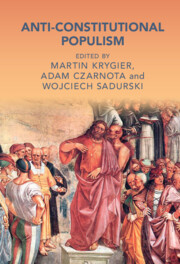Book contents
- Anti-Constitutional Populism
- Cambridge Studies in Law and Society
- Anti-Constitutional Populism
- Copyright page
- Contents
- Figures
- Contributors
- Acknowledgements
- Introduction: Anti-Constitutional Populism
- I Populisms
- II Courts
- III Anti-Constitutionalism After Post-Communism
- IV Eu Responses
- Chapter 11 Populism and the Crisis of Constitutional Pluralism
- Chapter 12 Populist Constitutional Grammar - Between Manipulative Borrowing and Bad (Judicial) Masters
- Chapter 13 Constitutional Populism versus EU Law: A Much More Complex Story than You Imagined
- V Concluding Reflections
- Index
- Cambridge Studies in Law and Society
- References
Chapter 11 - Populism and the Crisis of Constitutional Pluralism
from IV - Eu Responses
Published online by Cambridge University Press: 24 March 2022
- Anti-Constitutional Populism
- Cambridge Studies in Law and Society
- Anti-Constitutional Populism
- Copyright page
- Contents
- Figures
- Contributors
- Acknowledgements
- Introduction: Anti-Constitutional Populism
- I Populisms
- II Courts
- III Anti-Constitutionalism After Post-Communism
- IV Eu Responses
- Chapter 11 Populism and the Crisis of Constitutional Pluralism
- Chapter 12 Populist Constitutional Grammar - Between Manipulative Borrowing and Bad (Judicial) Masters
- Chapter 13 Constitutional Populism versus EU Law: A Much More Complex Story than You Imagined
- V Concluding Reflections
- Index
- Cambridge Studies in Law and Society
- References
Summary
At least for the last two decades, the idea of constitutional pluralism has been a central theme of European constitutional scholarship. Constitutional pluralism imagines the European legal space as a ‘heterarchy’, consisting of multiple autonomous and overlapping constitutional sites, each claiming ultimate authority over their respective domain and yet each respecting and accommodating the other. However, while the theory has always had its critics, especially in recent years constitutional pluralism seems to have gone from à la mode to enfant terrible. Especially with the emergence of autocratic governments in Hungary and Poland and the increased space of tension this has opened, constitutional pluralism is being increasingly decried as ‘unsustainable’, ‘inherently dangerous’, ‘prone to abuse’.1 Critics point to the ways in which illiberals and autocrats in Hungary and Poland have seized upon the idea of constitutional pluralism in order to justify non-compliance with EU law and vindicate their authoritarian constitutional projects against outside criticism. The criticism has culminated in a recently published open letter signed by 27 EU legal scholars in the aftermath of a much-discussed judgment of the German Constitutional Court, calling out what they perceive as the inherent deficiencies of constitutional pluralism and declaring that ‘national courts cannot override CJEU judgments’.2
- Type
- Chapter
- Information
- Anti-Constitutional Populism , pp. 401 - 433Publisher: Cambridge University PressPrint publication year: 2022

